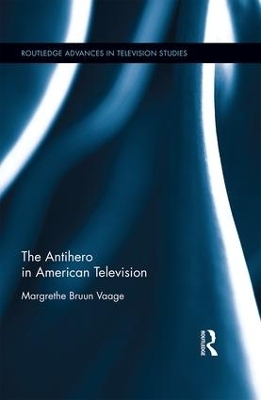
The Antihero in American Television
Seiten
2015
Routledge (Verlag)
978-1-138-88597-4 (ISBN)
Routledge (Verlag)
978-1-138-88597-4 (ISBN)
Characters such as mobster kingpin Tony Soprano, meth cook and gangster-in-the-making Walter White, and serial killer Dexter Morgan are not morally good, so how do these television series make us engage in these morally bad main characters? And what does this tell us about our psychological make-up and about the moral psychology of fiction?
The antihero prevails in recent American drama television series. Characters such as mobster kingpin Tony Soprano (The Sopranos), meth cook and gangster-in-the-making Walter White (Breaking Bad) and serial killer Dexter Morgan (Dexter) are not morally good, so how do these television series make us engage in these morally bad main characters? And what does this tell us about our moral psychological make-up, and more specifically, about the moral psychology of fiction?
Vaage argues that the fictional status of these series deactivates rational, deliberate moral evaluation, making the spectator rely on moral emotions and intuitions that are relatively easy to manipulate with narrative strategies. Nevertheless, she also argues that these series regularly encourage reactivation of deliberate, moral evaluation. In so doing, these fictional series can teach us something about ourselves as moral beings—what our moral intuitions and emotions are, and how these might differ from deliberate, moral evaluation.
The antihero prevails in recent American drama television series. Characters such as mobster kingpin Tony Soprano (The Sopranos), meth cook and gangster-in-the-making Walter White (Breaking Bad) and serial killer Dexter Morgan (Dexter) are not morally good, so how do these television series make us engage in these morally bad main characters? And what does this tell us about our moral psychological make-up, and more specifically, about the moral psychology of fiction?
Vaage argues that the fictional status of these series deactivates rational, deliberate moral evaluation, making the spectator rely on moral emotions and intuitions that are relatively easy to manipulate with narrative strategies. Nevertheless, she also argues that these series regularly encourage reactivation of deliberate, moral evaluation. In so doing, these fictional series can teach us something about ourselves as moral beings—what our moral intuitions and emotions are, and how these might differ from deliberate, moral evaluation.
Margrethe Bruun Vaage is Lecturer in the Film Department at the University of Kent, UK
Preface 1. Morally Murky: On Navigating Fictional Worlds by Moral Emotions and Intuitions 2. Partiality: How Knowing Someone Well Influences Morality 3. Suspense and Moral Evaluation: How Engagement Is Shaped by Suspense and Style 4. Why So Many Television Series with Antiheroes? The Attraction of the Antihero's Very Immorality 5. Crossing the Line: On Moral Disgust and Proper Villains in the Antihero Series 6. The Antihero’s Wife: On Hating Skyler White, and on the Rare Female Antihero Conclusion
| Reihe/Serie | Routledge Advances in Television Studies |
|---|---|
| Zusatzinfo | 16 Halftones, black and white; 16 Illustrations, black and white |
| Verlagsort | London |
| Sprache | englisch |
| Maße | 152 x 229 mm |
| Gewicht | 453 g |
| Themenwelt | Geisteswissenschaften ► Geschichte |
| Geisteswissenschaften ► Philosophie | |
| Sozialwissenschaften ► Kommunikation / Medien ► Medienwissenschaft | |
| ISBN-10 | 1-138-88597-5 / 1138885975 |
| ISBN-13 | 978-1-138-88597-4 / 9781138885974 |
| Zustand | Neuware |
| Haben Sie eine Frage zum Produkt? |
Mehr entdecken
aus dem Bereich
aus dem Bereich
wie KI und virtuelle Welten von uns Besitz ergreifen – und die …
Buch | Hardcover (2023)
Heyne (Verlag)
CHF 29,90
Eine Einführung
Buch | Softcover (2022)
Springer VS (Verlag)
CHF 46,15


